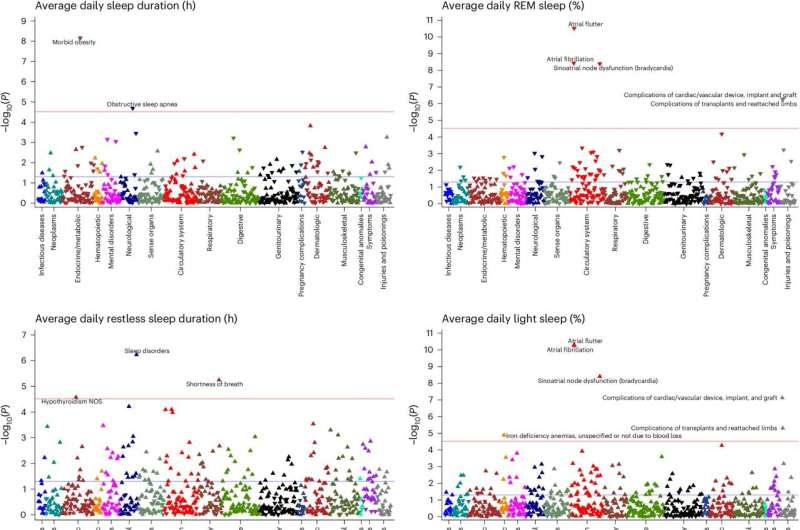
A team of medical researchers affiliated with a host of institutions across the U.S. has found via a study of Fitbit data that people who regularly sleep poorly are more susceptible to a wide range of chronic health problems than those who sleep normally.
In their study, published in Nature Medicine, the group analyzed sleep patterns of 6,785 adults who wore a Fitbit device to bed and correlated the data to the subjects’ health problems.
Prior research has shown that people with chronic sleeping problems are at higher risk of many health problems, many of which are related to cardiometabolic and psychiatric disorders. But associations between the two have been difficult to pin down due to the way data is collected in research efforts—typically, volunteers wear sensors as they sleep in a lab for just a few nights. Such efforts provide a very short window of opportunity.
Other studies have relied on self-reported sleep habits, but such reports are notoriously inaccurate. In this new effort, the research team sought to collect sleep data for thousands of people over a long period of time. To achieve this, they turned to Fitbit, a commercially available biosensor affixed to a bracelet that can be easily worn at night.
The researchers accessed and analyzed data from volunteers participating in the All of Us Research Program, which involved collecting nightly data from Fitbit users and user profiles, including sleep and health information.
The Fitbit device is able to detect sleep patterns by simultaneously monitoring heart rate and movement patterns while a person is sleeping and to accurately ascertain when a person is in REM, deep and light sleep, along with sleep duration and elapsed time of restless sleep. Profiles for the volunteers included disease history, age, gender, height, race, weight and other pertinent factors.
The researchers looked for patterns between sleep quality and incidence of diseases for all the people in the study. They found what they describe as an inverse association between deep and REM sleep and an increase in the probability of developing atrial fibrillation. They also found an association between sleep irregularity and major depressive disorders, obesity, anxiety disorder, hyperlipidemia and hypertension.
More information:
Neil S. Zheng et al, Sleep patterns and risk of chronic disease as measured by long-term monitoring with commercial wearable devices in the All of Us Research Program, Nature Medicine (2024). DOI: 10.1038/s41591-024-03155-8
© 2024 Science X Network
Citation:
Regular poor sleep linked to wide range of chronic health problems (2024, August 5)
retrieved 6 September 2024
from https://medicalxpress.com/news/2024-08-regular-poor-linked-wide-range.html
This document is subject to copyright. Apart from any fair dealing for the purpose of private study or research, no
part may be reproduced without the written permission. The content is provided for information purposes only.



